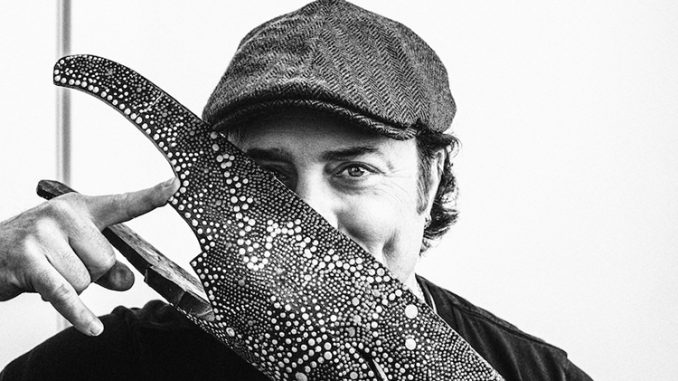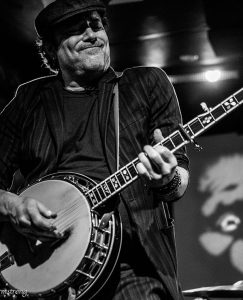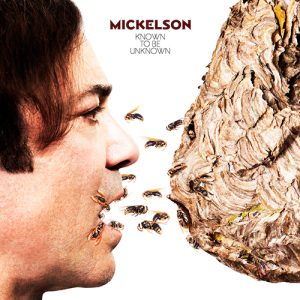
By Michael George Smith
Singer, songwriter, multi-instrumentalist, arranger, philosopher, producer, exhibited artist, children’s book author, husband, father, failed “rock star”, successful roots/folk artist, Grammy nominee, NYC escapee, San Franciscan… Scott Mickelson is all these things and more. So where to begin in understanding this remarkable creative? For Michael George Smith, it turned out to be a misheard lyric that proved the perfect launching point.
The song is ‘Ithaca’, from Mickelson’s 2022 album, Known to Be Unknown, and the line turned to actually be “How can you win, with the enemy’s within”.
 “That song, I’m referring to a trip I took to Ithaca, New York, where there’s the Ivy League school Cornell, and that town prides itself on being extremely progressive and Left Wing. And while I was there with my daughter, I made a comment that was anti-Trump, a sarcastic remark thinking that everyone around me, whoever I was talking to, would get the joke. But he was the one person in town who was as MAGA as MAGA could be” – the acronym for Make America Great Again for those readers who might have somehow managed to tune out of US politics the past eight years – “and started ranting and tellin’ me all the conspiracy stuff. So, the song is about how, you know, don’t assume who you’re with is who you’re with.
“That song, I’m referring to a trip I took to Ithaca, New York, where there’s the Ivy League school Cornell, and that town prides itself on being extremely progressive and Left Wing. And while I was there with my daughter, I made a comment that was anti-Trump, a sarcastic remark thinking that everyone around me, whoever I was talking to, would get the joke. But he was the one person in town who was as MAGA as MAGA could be” – the acronym for Make America Great Again for those readers who might have somehow managed to tune out of US politics the past eight years – “and started ranting and tellin’ me all the conspiracy stuff. So, the song is about how, you know, don’t assume who you’re with is who you’re with.
“And the funny thing is, the first time I performed that song, like right out of a book, a woman was in the audience who went to that school, and I thought she was gonna understand what I was saying in that song and she got so defensive – you know, ‘Cornell is the most progressive school in America,’ and then she starts getting in my face! So, I couldn’t win either way. I definitely say what I want to say whenever I wanted to say it – not at the risk of hurting someone… so anyway, that’s what that song is about.”
Mickelson was always going to be a songwriter – he tells me he’s been writing since he was five years old. It’s just taken a little longer than he could have ever imagined getting to this point, at least in terms of recognition and more importantly artistic integrity, which, as it turned out, for all the disappointments over his four decades at the coalface of this crazy business called music, was a good thing. There was plenty of promise back when it all kicked off. Mickelson was offered his first record deal back when he was 17 in 1982, when he was playing in a band that played all the iconic New York punk haunts – CBGB’s, The Bitter End and Kenny’s Castaways. It could’ve happened. They cut two singles and then it all went pear-shaped.
Somehow there was a manager waiting for him on the other side of the continent, in Los Angeles… I’ll return to that time a little later. By the 1990s, he’d put together a four-piece called Fat Opie. They signed to the same management company that looking after Neil Young and Tom Petty, cut an EP, Biscuits, in 1994 that got the right kinds of reviews and followed it with three albums – Hipsters, Freaks, Fags & Homeboys, Airstream and Otis – and somewhere in there they won one of those national talent contest, this one run by MTV. The prize? $US15,000 and the chance to perform live on MTV. In the end, they never got to tour with Neil Young or sign to his label, or the MTV exposure they’d won, but they did get the money. So, it all fell over. Turns it, the demise of Fat Opie was exactly what needed to happen.
“With Fat Opie, it was primarily a four-piece band, and I was still the singer and the songwriter, but I was writing songs that were limited with the orchestration, with whatever people could play in the band. Fat Opie was never a healthy relationship. We never really were friendly. We kind of stuck together because we had a momentum and just kept going until we couldn’t do it anymore. Once there was no more band, then I could start doin’ the kinds of productions and the kinds of arrangements I always wanted to do, and I could write more personally and not worry. I could just write what I wanted to write.
“And I also started producing a lot more. I always wanted to be a producer. With Fat Opie I couldn’t bring in a horn section or strings or work with other musicians. I had to work these musicians, so it was very confining being in that band. Once that was over, I was able to do it all myself, engineer myself, and it just so happened that the Mickelson album got me on the Grammy ballot and things like that, so it all worked out.”
For all that, there was one more Fat Opie album, Victoryville, released on Blue Pie Records in 2012, which came about after the guy who owned the gallery that was hosting an exhibition of Mickelson’s paintings, who happened to be a fan, asked if he could get the band back together to play at the launch. Victoryville is up there on Mickelson’s website if you want a copy.
Mickelson released his first solo album, Flickering, in 2015 and it did indeed manage to enter the Grammy ballot in two categories – Best Folk Album and Best Roots Music Performance – but ultimately neither gained him a full nomination. Not that it mattered. It turned out he found himself way too busy producing records for other people.
 For all his obvious love of lyrics, Mickelson also obviously loves the whole idea of playing with sounds, as evidenced by the occasional instrumental featured on his albums, whether exploratory, like ‘Blur in the Memory’, or as a kind of nod to a favourite band, like ‘Chicago Transit Authority’, both on the Known To Be Unknown album. Then there’s an “ode” to Brian Wilson on 2018’s A Wondrous Life titled, well, ‘Brian Wilson’.
For all his obvious love of lyrics, Mickelson also obviously loves the whole idea of playing with sounds, as evidenced by the occasional instrumental featured on his albums, whether exploratory, like ‘Blur in the Memory’, or as a kind of nod to a favourite band, like ‘Chicago Transit Authority’, both on the Known To Be Unknown album. Then there’s an “ode” to Brian Wilson on 2018’s A Wondrous Life titled, well, ‘Brian Wilson’.
“That Chicago one came about because I was drivin’ with my daughter and I said, ‘I think I’m done with this album. I think I’ve got all the songs that I can fit in.’ And she said, ‘Which song has horns on it?’ ‘Cos I always have horns on my records, and I said, ‘Oh shit, I don’t have any horns!’ The other instrumental (‘Blur In The Memory’), the problem with my last two records was that I’ve been so busy touring and producing – my production work pays for me to tour – that I always run out of time to write the number of songs that I need for a record, so it was a bit on the short side. So sometimes I’ll take the ending of a song and make a song out of that just so I have another track. That song, that has a really alt-rock thing, was all loops and things that I’d built up. And actually, the song ‘Unarmed American’, I never sat down and wrote that song. The last few bars of ‘Go To Bed Hungry’ had this great groove so I just made a loop out of that and became the beginning of ‘Unarmed American’ and I just wrote the lyrics line by line and fleshed it out.
“It’s very rare… I would say maybe two out of ten songs I sit there with an idea, I’m gonna write about this. It doesn’t really work that way. It’s pretty stream of consciousness, and I figure out what the song is about after the song is over. It’s all coming from within, but I don’t sit there and say, ‘Hey, I’m against this. I’m gonna write a song it.’ Or ‘I’m gonna write an instrumental.’”
There are no instrumentals on the album – his tenth, titled If You Can’t Be Right, Be Loud – that Mickelson will finish when he returns to the States after his solo acoustic Australian tour. The other thing about the way Mickelson writes and records his albums is that he follows the song, allowing it to be whatever genre it wants to be, rather than imposing a genre. So, it can be a swaggering Stonesy kind of thing or big and brassy Chicago or a slice of Americana or whatever.
“Yeah, I was raised in the classic rock era. My first concert was Elvis Presley, my parents took me to see Jerry Garcia and the Grateful Dead in 1974, I saw Joni Mitchell in the ‘70s… of course the Beatles, my favourite band. I’ve always been interested in the idea of production and arranging, in the art of recording. I’m too eclectic, which is part of the reason why it’s been tough for me to be put into a genre or easily packaged. I’m always changing, but it’s very organic – it’s old school, kinda like Neil Young in a way – he just does what he’s got to do.”
At which point, since we’re talking about arrangements, it’s time to take you back to what happened back in the 1980s when Mickelson found himself in Los Angeles. “I was under contract and I got to work with a couple of really amazing arrangers. One guy, named Jimmy Haskell, he won a Grammy for ‘Bridge Over Troubled Water’, Chicago’s ‘If You Leave Me Now’, Steely Dan’s ‘My Old School’ – he was the guy who, if you had a budget to bring in some horns and strings and you were in LA, he was the number one guy. His track listing is just ridiculous – he was the master of that. And we had access to him in kind of an odd way because the drummer in my band at that time – this before Fat Opie – his mother was in a Jewish chorus band – and Haskell was their piano player and then went on to become this successful arranger. So, when we were in LA and we needed horns, he did us a favour and I got to work with him, be at his house, watch him working and ask him questions and bug him. I was only about 19 and I just learned so much, the way he thought about arranging and this whole idea of inhabiting negative space, of seeing it as a canvas of negative space, that really made a huge impression on me, and I resort to it all the time.
Another guy, who didn’t work on any of my material but was working at the studio we were working in, he was doing strings for McCartney, Prince, Michael Jackson… I mean, he was just there every day, and my producer used to engineer his string section sessions. So, listening to those sessions, hearing him talk about it and break down and cry as he listened, these experiences at such a young age made an impression on me. All of that, and the love of music, I still carry with me, with everything I do I’m resorting to, those classic production and arranging.”
The other thing about the music Mickelson has released in the past three or four years is the extraordinary film clips that have accompanied them, especially the one for his latest single, ‘Jump Off The Earth’, from that forthcoming album, If You Can’t Be Right, Be Loud.
“I was in my early thirties when I decided I couldn’t do Fat Opie anymore so I just quit music, gave away all my gear, stopped telling anybody I was a musician and my wife said to me, ‘You need to do something. Go to art school – you like design.’ So, I just immersed myself in doing all that stuff. I think that rhythm and colour are the same things in the brain, are understood by the same part of the brain, so it wasn’t a big stretch to do the one instead of the other. So now I do all my graphics – technology and art, it’s great.
“The video I did for ‘Jump Off The Earth’, I knew I wanted to do something with AI – I was doing images with AI because I think it’s fun and exciting – but when it all started, the couple of programs all looked the same – it’s a tool and everybody’s picking up the same paintbrush. So, I didn’t see anybody doing full AI animated videos. I knew what I wanted to do but I didn’t have the time or the studio setup so I found this guy in Germany on Instagram who was doing little 18 second clip animations and I told him I wanted it to work in horizontal for YouTube and run around four and a half minutes. So, I just wrote out the lyrics and after every line I wrote out a series of prompts that he could type in – Man steering a boat, Fifties décor – and then you see what you get. So, he would keep sending me clip after clip, bunches of clips for each line, three seconds here, two seconds there, and onto the next line until I had this huge folder of all this footage and I edited it all down.”
So, there you go – technology used for good! And as for that forthcoming album, If You Can’t Be Right, Be Loud, as he’ll tell you when he comes to a stage near you, it’s just the American thing – “Everybody in America over-reacts!” Just know that if the MAGAs manage to win the election, Mickelson might just be moving to an Australian city near you!
MICKELSON AUSTRALIAN TOUR
Thursday 29 Feb – The Lyrebird in Elsternwick
Saturday March 2 – Retreat Hotel, Brunswick, Victoria
Sunday March 3 –Bodriggy Brewing Company, Abbotsford, Victoria
Wednesday March 6 – The Bergy Seltzer, Brunswick, Victoria,
Thursday March 7 – Wesley Anne, Northcote, Victoria
Friday March 8 – Shedshaker Brewing Company, Castlemaine, Victoria
Saturday March 9 – The Catfish, Fitzroy, Victoria
Sunday March 10 – The Drunken Poet, West Melbourne, Victoria
Wednesday March 13 – The Midnight Special, Newtown, NSW
Thursday March 14 – Link & Pin Café, Woy Woy, NSW
Friday March 15 – Petersham Bowling Club, Petersham, NSW

